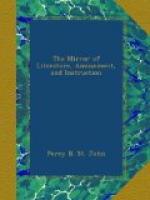[1] The reader may often have
noticed in county advertisements
the two sheriffs designated
as one officer. Thus, in the
advertisement of the recent
Middlesex election:—
Sir Chapman
Marshall, } Sheriff of Middlesex.
Sir W.H.
Poland. }
[2] This reminds one of the
admiration of the Lord Mayor in
Richard III. by George the
Second, so ill-timedly expressed by
the King to Garrick, the stage
king:—
“Fine
Lord Mayor! capital Lord Mayor! where you get such
Lord
Mayor?”
Mr. Oldfield described this borough fourteen years ago, as consisting of only forty-two houses, and half a church, the other part having been demolished. Here were six if not eight parish churches: namely, St. John’s, (which was a rectory, and seems to have been swallowed up by the sea about the year 1540;) St. Martin’s, St. Nicholas’s, and St. Peter’s, which were likewise rectories; and St. Leonard’s and All Saints, which were impropriated. The register of Eye also mentions the churches of St. Michael and St. Bartholomew, which were swallowed up by the sea before the year 1331. The ocean here appears to have almost a corporation swallow. The walls, which encompassed upwards of seven acres of land, had three gates. That to the eastward is quite demolished; but the arches of the two gates to the westward continue pretty firm, and are of curious workmanship, which nature has almost covered with ivy.
By aid of the excellent parliamentary anatomy, in the Spectator newspaper, we learn that DUNWICH, according to the census of 1821, contained 200 persons.
The “patrons,” or “prevailing influence,” are Mr. M. Barne and Lord Huntingfield. The number of votes is 18.
The members “returned” to the last parliament were F. Barne and the Earl of Brecknock, who were also returned at the recent election.
* * * * *
Old Sarum, Wilts, the second Borough, has been already fully illustrated in vol. x., No. 290, of The Mirror. It fell, or was rather pulled down, in consequence of a squabble between the civil and ecclesiastical authorities; and soon after 1217, the inhabitants removed the city, by piecemeal, to another site, which they called New Sarum, now Salisbury. The site of the old city was very recently a field of oats; and the remains of its cathedral, castle, &c., were heaps of rubbish, covered with unprofitable verdure. We may therefore say,
Ubi seges, Sarum fuit.
Mr. Britton, in the Beauties of England and Wales, discourses diligently of its antiquarian history, which we have glanced at in our tenth volume. It is in the parish of Stratford-under-the-Castle; and under an old tree, near the church, is the spot where the members for Old Sarum are elected, or rather deputed, to sit in parliament. The father of the great Earl of Chatham once resided at an old family mansion in this parish; and the latter was first sent to parliament from the borough of Old Sarum, in February, 1735; yet “the great Earl Chatham called these boroughs the excrescences, the rotten part of the constitution, which must be amputated to save the body from a mortification.”—(Oldfield.)




